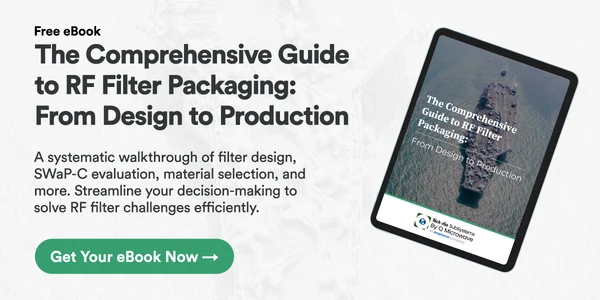RF filters, or radio frequency filters, are essential components in modern communication systems,...
High Pass vs. Lowpass Filters: Which is Best for Your Application?

Signal integrity is a critical determinant of success or failure in military and aerospace systems. The battlespace is inundated with radio frequency (RF) signals. Even without enemy jamming, extraneous RF sources such as nearby radio stations or communication devices can degrade signal quality.
How can signal processing techniques mitigate interference and achieve robust communication in unpredictable RF environments?
RF and electrical engineers utilize high pass and lowpass filters to enhance signal clarity and accuracy for communication, radar, and navigation applications. These filters delineate and control frequency spectrums to reduce unwanted electromagnetic interference and sustain clear and precise communication channels.
Military operations rely on these filters for enhanced performance and precision. Uninterrupted communication channels minimize the risk of miscommunication, which could result in casualties. The proper filter optimizes radar systems to detect and track potential threats more accurately.
RF and electrical engineers must thoroughly understand these filters' operational principles and use cases. This knowledge also benefits troubleshooting and optimizing existing systems.
Discover the functionalities and real-world applications of high pass and lowpass filters to determine the most appropriate for your application.
High Pass vs. Lowpass Filters: Understanding The Difference
High pass and lowpass filters facilitate the transmission of specified spectral components while attenuating non-targeted frequencies. High pass filters allow frequencies above a specified cutoff point to pass through while attenuating frequencies below that point. Conversely, lowpass filters permit frequencies below a specified cutoff point to pass through while attenuating frequencies above that point.
 Lowpass vs. High Pass Filters via All About Circuits
Lowpass vs. High Pass Filters via All About Circuits
Lowpass Filters: Functionality and Real-World Applications
Lowpass filters eliminate high-frequency noise that obscures or distorts signals during target detection and tracking, allowing lower frequencies to pass through. RF systems widely utilize these filters to eliminate unwanted high-frequency noise and interference and attain clear, reliable signals.
Advanced design techniques minimize signal distortion and maintain reliable operation in harsh environmental conditions, including applications in:
Military Radar Systems
Lowpass filters are integral to radar systems. A radar system encounters high-frequency interference that impairs target detection and tracking. Implementing lowpass filters mitigates this interference to maintain the precision and reliability of lower-frequency radar signals for accurate target identification. In other words, they eliminate high-frequency noise and interference to enable precise target detection and tracking which, in turn, guarantees the unimpeded transmission of vital low-frequency signals. These signals also propagate more effectively underwater, which is advantageous for submarines and other underwater systems.
Communication Systems
A communication system in a military vehicle must ensure clear transmission of low-frequency signals critical for operations. Lowpass filters eliminate high-frequency noise to preserve the integrity of these essential low-frequency signals for effective communication.
When Do You Need a Lowpass Filter?
Generally, you need a lowpass filter when it is essential to attenuate high-frequency interference and noise to preserve and accurately process low-frequency signals. Here are several scenarios where implementing a lowpass filter is crucial:
-
Communication Systems: A lowpass filter transmits low-frequency signals in communication systems, particularly in military applications. These filters maintain the fidelity of these signals by mitigating the impact of high-frequency interference.
-
Radar Systems: A lowpass filter removes high-frequency interference in radar technology to achieve precise detection and tracking of targets. It maintains the clarity of radar signals to facilitate accurate target identification and tracking.
High Pass Filters: Functionality and Real-World Applications
High pass filters allow higher-frequency signals to pass while obstructing lower-frequency signals. This functionality is essential in RF systems to eliminate low-frequency noise and interference.
High pass filters excise low-frequency noise in communication radar systems to preserve the high-frequency components that convey critical information for defense applications. These filters block lower frequencies to promote signal integrity and clarity. They also feature low cutoff frequencies and steep roll-off characteristics to attenuate unwanted components while preserving necessary signals.
The following are critical applications of high pass filters across various advanced systems:
Military Communication Systems
Communication devices often pick up low-frequency noise from surrounding machinery and vehicles during missions. High pass filters can block noise to transmit high-frequency voice and data signals clearly and reliably. Essentially, military communication systems utilize high pass filters to attenuate low-frequency noise, which can compromise the integrity of voice and data transmission.
Electronic Surveillance
Intelligence-gathering apparatuses necessitate the exclusion of low-frequency background noise to capture high-frequency transmissions from adversary communications accurately. This process preserves the monitoring of enemy movements and strategic communications while maintaining clarity. Basically, low-frequency background noise hinders intelligence-gathering equipment designed to intercept high-frequency signals. High pass filters help equipment filter out the noise to focus on and accurately capture high-frequency signals.
Sonar Systems
Naval sonar systems can detect a range of underwater sounds. However, low-frequency background noise can obscure detecting high-frequency signals from submarines. High pass filters eliminate low-frequency noise to enhance the detection accuracy and identification of underwater objects.
When Do You Need a High Pass Filter?
You need a high pass filter to block low-frequency noise or interference while allowing high-frequency signals to pass through for precise and reliable signal transmission. Consider the following scenarios where implementing a high pass filter is essential:
-
Eliminating Low-Frequency Noise: A high pass filter is necessary to attenuate undesired low-frequency components or interference within a signal. You can use these filters in audio engineering to remove rumble or hum from recordings to enhance signal fidelity.
-
Preserving High-Frequency Signals: You can rely on a high pass filter when the critical information within your signal resides in higher frequencies. This filter blocks low-frequency noise to maintain the integrity of high-frequency voice signals in communication systems.
-
Electronic Surveillance: A high pass filter eliminates low-frequency background noise in electronic surveillance and intelligence gathering to detect and analyze high-frequency signals. This process enhances signal clarity and detection accuracy.
-
Sonar and Radar Systems: A high pass filter detects high-frequency signals and removes low-frequency clutter for accurate target detection and tracking.
Q Microwave: Your Partner in Choosing the Right RF Filter
"Understanding whether you need a high pass or lowpass filter depends on the type of signals you're trying to isolate. A high pass filter allows high frequencies to pass through while blocking lower ones, whereas a lowpass filter allows only low frequencies to pass, blocking the higher ones. Decide based on whether you need to eliminate high-frequency signals to focus on low frequencies, or eliminate low-frequency signals to focus on high frequencies."
- David Higginson MBA, PMP, Director of Business Development, Q Microwave
High pass and lowpass filters are indispensable tools for military and space technology. The choice between them hinges on the specific requirements of your applications.
If you want customized high pass and lowpass filters tailored to your needs, partner with our expert RF engineers at Q Microwave.
We specialize in producing custom, small-sized filters tailored to meet the demands of any project. For over 25 years, Q Microwave has worked closely with our clients and suppliers to guarantee that every component meets your needs. Contact our team today to enhance defense systems or solve specific filtering challenges.




